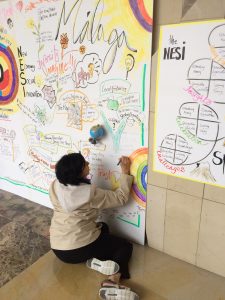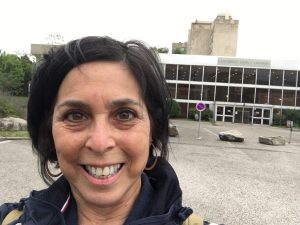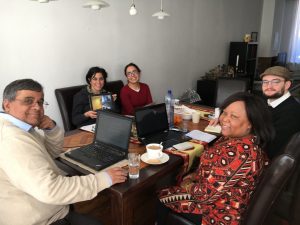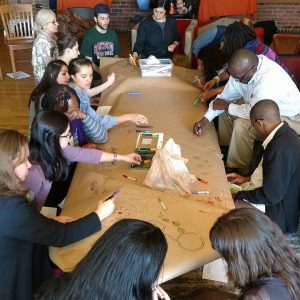Associate Professor Melanie E. L. Bush, Ph.D. M.P.H., Department of Sociology, is deeply engaged internationally, with a multitude of projects and colleagues that span the globe.

Associate Professor Melanie E. L. Bush, Ph.D. M.P.H., adds to a pictorial model at the New Economy and Social Innovation Global Forum in Malaga, Spain.
Best known at Adelphi for her teaching, passion for social justice and the Collaboration Project, Associate Professor Melanie E. L. Bush, Ph.D. M.P.H., Department of Sociology, is deeply engaged internationally, with a multitude of projects and colleagues that span the globe. The Center for International Education caught up with Dr. Bush this summer and is delighted to share her recent work.
Dr. Bush is working with a team of scholars from South Africa, Zimbabwe (living in Finland), Mexico (living in the Netherlands) and the United States (one presently moving to Cairo) as lead organizer of a project to compile a decolonial textbook for the social sciences. This textbook seeks to highlight ways of being in this world that are currently marginalized, denied and/or exoticized in the western canon, which emerged through coloniality in the modern world. As such, the textbook will highlight pluriversal approaches to social relations that do not follow a Eurocentric template that emphasizes dualisms between aspects of being and related entities. The team will present their progress and engage in dialogue about the project at the Association of Humanist Sociologists at the University of Havana, Cuba, in November 2017.
Dr. Bush has also been engaged in research interviewing people involved in solidarity economy projects: Cooperation Jackson in Mississippi and Brattleboro Time Bank in Vermont. While still involved in the data collection, she has begun the analysis and public discussion about her findings. The central question is to what extent these projects are contextualized within capitalist social relations and forms of production—do they aim to function “outside the system” or to create opportunities “within the system.” What are their goals and what are their experiences? This movement is global and being both engaged and studied in many places throughout the world.

Dr. Bush at the Society for the Advancement of Socio-Economics conference at the University of Lyon, France, where she presented research on solidarity economy projects.
For example, at the New Economy and Social Innovation Global Forum in Malaga, Spain, in April, Dr. Bush discussed the projects and constituencies, their similarities and distinctions and the significance and implications. At the NESI Forum, participants drew from projects being developed in different parts of Europe, and developed a Manifesto for a New Economy. At the conference she also participated in a workshop about how to educate children about the economy, and discussions continue about a possible related project to research and document resources, curricula and pedagogical strategies. Most recently in June, at the Society for the Advancement of Socio-Economics Annual Meeting in Lyon, France, Dr. Bush presented a paper describing participants’ experiences in the projects.
This August, Dr. Bush will moderate a session on Solidarity Economy Projects at the Society for the Study of Social Problems Annual Conference in Montreal, Quebec. The meeting will focus on the theme Narratives in the World of Social Problems: Power, Resistance, Transformation. Dr. Bush will also present a paper analyzing what is represented in the two projects she is studying. To what extent are these examples of a “new world” in the making; to what extent do they leave structures in tact by meeting critical needs, thereby allowing for capitalist ways of operating to still function.

Dr. Bush meets with colleagues in The Hague to work on a text book focusing on marginalized ways of being in this world.

Dr. Bush works with youth at the Clark University Words Remake Life global convergence on methods to decolonize communicative praxis and university spaces, April 2017.
For further information, please contact:
Department of Sociology
Blodgett Hall Room 102
p – 516.877.4943